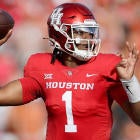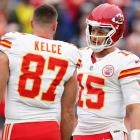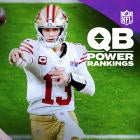The Cowboys were one of two NFL teams, along with the Colts, that were below the NFL Collective Bargaining Agreement's requirement of spending 89 percent of the salary cap in cash from 2017-20 at the period's halfway mark. That's in the process of changing. Defensive end Demarcus Lawrence, who was franchised for a second straight season, joined Rams interior defensive lineman Aaron Donald and Bears edge rusher Khalil Mack in the $20 million per year non-quarterback club last month by signing a five-year, $105 million contract with $65 million in guarantees.
Cowboys chief operating officer and executive vice president Stephen Jones revealed last week that negotiations for wide receiver Amari Cooper and quarterback Dak Prescott, who are in a contract year, were "off and running." He also acknowledged that running back Ezekiel Elliott is also in the long-range plans.
The Cowboys' plan is to try to replicate the triplets concept of the 1990s, starring quarterback Troy Aikman, running Emmitt Smith and wide receiver Michael Irvin, which produced three Super Bowl victories in a four-year span. Jones suggested at an annual golf outing for team sponsors last week the new triplets should leave a little money on the table to make it easier for the Cowboys to keep the core of the team intact, hoping the players place a premium of winning championships.
"If we can talk them into not maxing out, doing well, but not maxed out, that allows us to have other good football players around them," Jones said, per the Dallas Morning News. "And we all know what happens, you look at the TV booths and look at what these players do off the field. If we can put Super Bowl rings on these guys, they'll be legends around this area for many, many, many years to come. What they may give up a little bit in their contract, they should be able to invest in being a Cowboy and making our teams better."
Agents let those types of pleas go in one ear and out the other. It isn't a player's job or responsibility to help a team manage the salary cap, which Jones concedes. An agent is focused on maximizing his client's contract with the most player-friendly structure possible, unless given specific instructions to do otherwise by who he represents. The only player to consistently give hometown discounts on contracts is Patriots quarterback Tom Brady, which started with his 2013 renegotiation.
Signing the new triplets long-term is going to be an expensive proposition. The players seeking their market value could affect the composition of the Cowboys roster in the future.
Dak Prescott
The Cowboys have repeatedly affirmed their belief publicly that Prescott is the answer at quarterback. Owner Jerry Jones said last week on The Rich Eisen Show the Cowboys are sold on Prescott, who is scheduled to make $2.025 million in 2019 thanks to earning the performance escalator available to third- through seventh-round picks in the final year of rookie contracts.
Prescott is going to be the beneficiary of the ever-escalating quarterback market. Seahawks quarterback Russell Wilson surpassed Packers quarterback Aaron Rodgers last month as the NFL's highest-paid player, signing a four-year, $140 million extension averaging $35 million per year. Wilson's contract has an NFL-record $107 million in guarantees. $70 million was fully guaranteed at signing. Steelers quarterback Ben Roetlishberger, who is 37, received a two-year, $68 million extension towards the end of last month.
It's conceivable that Prescott could join these three quarterbacks and Falcons signal caller Matt Ryan in the $30 million per year club, although he is largely regarded as a game manager who rarely wins games with his arm. Prescott has already stated he has no interest in following Brady's lead contractually.
Only Brady, who is arguably the greatest football player of all-time, has more than Prescott's 32 regular-season wins since he entered the NFL in 2016. Prescott's 14 game-winning drives are the most in league history during a quarterback's first three NFL seasons. The Cowboys have won the NFC East twice in three years with the 2016 NFL Offensive Rookie of the Year at quarterback.
Prescott became a more effective quarterback last season after Amari Cooper, the legitimate receiving threat the Cowboys offense was lacking, was acquired from the Raiders as the late October trading deadline was approaching.
Prescott had the NFL's fourth-best completion percentage (71.6) over the second half of the season. He also ranked in the top ten in with 289 pass attempts (seventh), 2,225 passing yards (eighth) and a 103.4 passer rating (seventh). He threw 12 touchdowns and only three interceptions. The Cowboys tied the Colts at 7-1 for the NFL's best record in the second half of the season.
Prescott's statistical improvement should be encouraging to the Cowboys. Throwing for 387 yards and a career-high four touchdown passes in a come-from-behind 36-35 victory over the Giants in the regular-season finale without key members of the offensive line and Elliott -- since the game didn't have any playoff implications for Dallas -- was also a positive step.
Five impressive starts after a 2017 midseason trade from the Patriots were all the 49ers needed to give quarterback Jimmy Garoppolo a five-year, $137.5 million contract in February 2018, which briefly made him the NFL's highest-paid player at $27.5 million per year. Garoppolo's contract has $74.1 million in guarantees, of which $48.7 million was fully guaranteed at signing. Prescott has a much greater body of work than Garoppolo.
The Cowboys quarterback is destined for a franchise tag in 2020 if he plays out his rookie contract. The 2020 non-exclusive quarterback number should be in the $27 million range if the salary cap is in the neighborhood of $200 million next offseason. A second franchise tag in 2021 at a CBA-mandated 20 percent increase over the 2020 franchise number would be over $32 million.
The exclusive franchise tag might be in order if Prescott's contract expires, since it would prohibit him from soliciting an offer sheet from other NFL teams. Most quarterbacks receive the exclusive designation. The calculation is different from the non-exclusive version. An exclusive designation for Prescott would be the average of the top five 2020 quarterback salaries (usually salary cap numbers) when the restricted free agent signing period ended, which would be about a week before the 2020 NFL Draft. This number currently projects to $32.221 million. A second franchise tag in 2021 at a 20 percent increase over Prescott's 2020 franchise number would be $38,662,520.
The Cowboys should be willing to give Prescott a contract at least approximating the average of the 10 highest-paid quarterbacks to avoid playing the franchise-tag game with him. The average of the five and 10 highest-paid quarterback contracts are summarized in the chart below
| Averages | Contract guarantees | Fully guaranteed | Average salary | Contract length |
|---|---|---|---|---|
| Top 5 QBs | $91,340,000 | $72,940,000 | $32,000,000 | 3.6 Years |
| Top 10 QBs | $80,700,000 | $58,970,000 | $28,662,375 | 4 Years |
Waiting to sign Prescott is going to be more costly, particularly if his performance in the second half of 2018 is a sign of things to come. Any extensions top two overall picks Jared Goff and Carson Wentz sign with the Rams and Eagles, respectively, are likely going to be in excess of $30 million per year. Since Goff and Wentz have the same representation as Roethlisberger, his deal is probably going to be an important data in their negotiations.
Amari Cooper
It didn't take long for Cooper to make his presence felt while getting acclimated to a new offense. Jerry Jones declared Cooper was "making a bid for his cash" after catching eight passes for 180 yards and scoring two touchdowns against the Redskins on Thanksgiving. It was the most receiving yards by a Cowboys wide receiver since Dez Bryant's 224 in 2012. Cooper's effort earned him NFC Offensive Player of the Week honors. The Cowboys went 7-2 with Cooper in the lineup to win the NFC East with a 10-6 record. The four-year veteran had his third season with at least 70 receptions and 1,000 receiving yards despite the challenges of a midseason trade.
The Cowboys didn't give their 2019 first-round pick (27th overall) to the Raiders for Cooper to have a short stint in Dallas. There was a report last week, which was later disputed, about Cooper asking for a shockingly high number.
Regardless of the report's validity, Joel Segal will likely drive an extremely hard bargain for Cooper, whose contract expires after the 2019 season thanks to Oakland exercising its fifth-year option at $13.924 million last April. He made Mack the NFL's highest-paid non-quarterback at $23.5 million per year on the six-year extension containing $90 million of guarantees he negotiated in conjunction with his client's trade from the Raiders last Labor Day weekend. More impressively, Segal got the Rams to grossly overpay wide receiver Tavon Austin, a current Cowboys backup, on a four-year extension in 2016 averaging approximately $10.5 million per year with two years remaining on his rookie contract.
It wouldn't be surprising for Segal to attempt to use the 2015 contract the Cowboys gave Bryant, Cooper's predecessor as the No. 1 wide receiver in Dallas, while he was designated as a franchise player against them by insisting that the deal after adjusting for salary cap inflation should be the starting point for serious discussions. Bryant signed a five-year, $70 million deal with $45 million in guarantees where $32 million was fully guaranteed at signing.
The salary cap has increased by 31.35 percent since Bryant signed. An equivalent deal under the current $188.2 million salary cap would average nearly $18.5 million per year. It would have just under $60 million in guarantees and approximately $42 million fully guaranteed at signing.
A point of contention in negotiations may be how to value Antonio Brown's deal. The four-year, $68 million extension Brown signed in 2017 was upgraded in connection with his March trade from the Steelers to the Raiders. Brown received an $11.2 million raise over the three remaining years of his contract to bring his total compensation during this span to $50.125 million. He has the potential to earn an additional $4 million through incentives.
The NFLPA and the agent community are viewing the change as an enhancement to the 2017 extension, since Brown received the increase in salary without adding any new years to his contract. From the players' side of the equation, Brown has a deal averaging $19.8 million per year where there is $79.2 million of new money over his four new contract years since the 2017 signing.
The Cowboys might focus on the total compensation the Raiders will be paying Brown over the length of his contract. Under this interpretation, Brown has a three-year, $50.125 million deal averaging $16,708,333 per year.
Cooper wouldn't become the NFL's highest-paid wide receiver under the agent community's view of Brown's deal with the Cowboys accepting the adjusting of Bryant's contract. He does when the focus is on what Oakland will pay Brown.
Odell Beckham, Jr., who was traded to the Browns in March, became the financial benchmark for wide receivers in most key contract metrics last preseason. The Giants signed him to five-year, $90 million contract extension averaging $18 million per year. The deal is worth as much as $95 million through salary escalators based on Beckham performing like he did in his first three NFL seasons where he averaged 96 catches for 1,374 yards and nearly 12 receiving touchdowns. Beckham's $65 million in overall guarantees is the most ever in a wide receiver contract, and $40.959 million was fully guaranteed at signing.
Ezekiel Elliott
The Cowboys exercised their option for a fifth year in 2020 with Elliott, the fourth-overall pick in the 2016 NFL Draft, late last month. Elliott's option-year salary will be $9.099 million. There isn't the same type of signing urgency with Elliott as there is with Cooper and Prescott, as Elliott isn't in a contract year.
Nonetheless, Stephen Jones has acknowledged that long-range budgeting contemplates a new Elliott contract at some point. There has been speculation that Elliott could hold out if he doesn't have a new deal by the start of training camp. Elliott has been participating in the Cowboys' offseason workout program.
Jones recently called Elliott the straw that stirs the drink. Elliott, who has played three NFL seasons, won his second rushing title in 2018 with 1,434 yards on the ground. He became more a threat in the passing game last season with a career-best and team-high 77 receptions. Elliott was also second in the NFL with 2,001 yards from scrimmage (combined rushing and receiving yards) despite sitting out the regular-season finale.
If the Cowboys start to believe a training camp holdout by Elliott is a realistic possibility, it could work to his advantage. The team may not have an interest in history repeating itself given Elliott's impact offensively. It took Dallas getting off to an 0-2 start in 1993 when trying to repeat as Super Bowl champions for Emmitt Smith to get a contract making him the NFL's highest-paid running back to end his holdout. Fortunately for Elliott, the Cowboys also have a history of early extensions for first-round picks. Center Travis Frederick and offensive tackle Tyron Smith received new deals before their fourth seasons started.
The four-year, $57.5 million extension (worth a maximum of $60 million through salary escalators) the Rams gave Todd Gurley last July will likely be the most important data point for Elliott, since it's the current salary benchmark for running backs. Gurley's situation might be the most analogous anyway, since he's a first-round pick, like Elliott, who got a new deal after his third NFL season. The Gurley deal has $45 million in guarantees, which includes $21 million signing bonus. Both are the most ever in a running back contract.
The Cowboys would be wise to start reducing Elliott's workload whenever is reasonably practical in order for him to have the best shot at being highly productive once he gets his inevitable big payday, since he is accumulating mileage at an almost unprecedented rate. Elliott is averaging 21.7 carries a game in the NFL (868 rushing attempts in 40 games). Only three running backs in NFL history have had a higher usage rate during their first three seasons: Edgerrin James (23.87 carries per game), Eric Dickerson (23.06) and Earl Campbell (22.67). Last year, Elliott had a career-high 384 touches (combined rushing attempts and receptions), which led the NFL.
The rest of the roster
The Cowboys have a little more flexibility with the timing of signings than they would ordinarily have since 2020 is the final year of the CBA. A franchise and transition designation can both be used in 2020 instead of one or the other like in the CBA's first nine years. Nonetheless, Dallas still needs sign either Prescott or Cooper to an extension in 2019 to ensure that cornerback Byron Jones, who is currently playing on a $6.626 million fifth-year option, doesn't hit the open market next year.
Jones thrived in moving to cornerback full-time from free safety last season. He earned his first Pro Bowl berth and second-team All-Pro honors in 2018. The going rate for high level cornerbacks is $14 million to $15 million per year with over $40 million in guarantees where at least $30 million is fully guaranteed at signing. The 2020 cornerback franchise number is probably going to exceed $16.5 million with continued salary cap growth.
Right tackle La'el Collins, who will be an unrestricted free agent in 2020, could become a luxury rather a necessity if the triplets land long-term contracts. The Cowboys already have three high-priced offensive linemen in Frederick, Smith and Zack Martin. Swing tackle Cameron Fleming is under contract next year at $4.5 million should the Cowboys choose to pick up his option.
Linebacker Jaylon Smith, a 2016 second-round pick, has made a remarkable recovery from the gruesome knee injury he suffered in the Fiesta Bowl while at Notre Dame. He played at a Pro Bowl level last season. Since he didn't earn an accrued season (i.e., a year of service for free agency) while on the non-football injury list in 2016 as a rookie, he will be a restricted free agent in 2020 instead of an unrestricted free agent. The Cowboys will have the right to match any offer sheet he signs with another team and receive at least a second-round pick as compensation with an unmatched one.
The Cowboys made a conscious decision to let multiple linebackers walk in free agency during the 1990s and early 2000s, including Dixon Edwards, Randall Godfrey, Robert Jones, Ken Norton, Jr. and Darrin Smith. It remains to be seen whether the Cowboys start re-visiting this approach.
Dallas doesn't run the risk of getting back into salary cap hell like in the early part of the decade and the late 1990s with the triplets as a major part of the future. There are a little over $115 million of cap commitments in 2020 (36 players under contract). Only three teams, the Bills, Dolphins and Texans, currently have fewer 2020 cap obligations. Even if the cap starts becoming tight, the Cowboys have consistently been willing to aggressively manage the cap where multiple contracts are restructured to free up space.





















